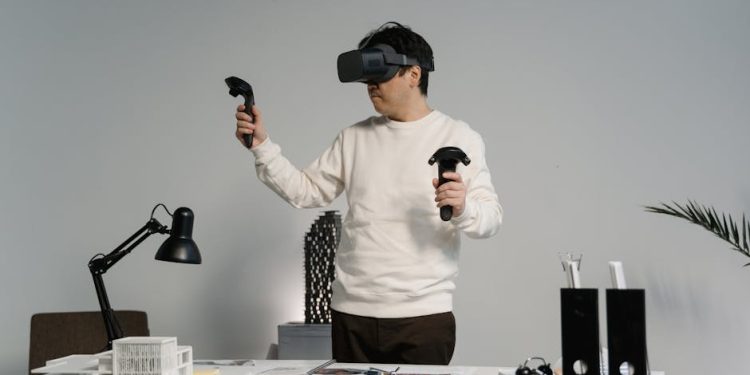No products in the cart.
The Trillion-Dollar Gamble: AI’s Uncertain Future and Its Impact on Jobs
As AI technology surges, its potential to reshape job markets raises urgent questions. Will this be a new Industrial Revolution or a bubble waiting to burst? Dive into the analysis.
As the sun sets over silicon valley, the golden glow reflects not just on the tech giants but on a burgeoning economic force: artificial intelligence (AI). With investors pouring a staggering trillion dollars into AI startups, the question looms large: Are we witnessing the dawn of a new Industrial Revolution, or are we on the brink of a massive economic bubble?
This duality of thought mirrors the complexities of the technology itself. On one hand, AI promises to revolutionize industries, creating new job opportunities that were previously unimaginable. On the other, it raises fears of obsolescence, as machines become capable of performing tasks once reserved for humans.

Historically, the Industrial Revolution brought about massive societal shifts. Jobs evolved, new industries emerged, and while some were displaced, many more were created. Today, a similar narrative is unfolding. The rise of AI is not just a technological advancement; it is a profound change in how we conceive work and productivity.
But let’s dig deeper. According to a recent report by the World Economic Forum, AI could displace 85 million jobs by 2025. Yet, it could also create 97 million new roles tailored to the evolving landscape. This paradox is where the real story lies. The challenge for the current workforce, particularly those aged 16 to 35, is not merely to adapt but to thrive in this shifting environment.
 Career Development
Career DevelopmentWomen’s Workforce Participation in India Reaches New Heights
India's women's workforce participation has doubled, driven by industry initiatives supporting their return to work, marking a significant shift in…
Read More →Consider the story of Emma, a 25-year-old graphic designer who found herself at a crossroads when her company decided to integrate AI-driven design tools. Instead of resisting this change, Emma took it as an opportunity to upskill. She enrolled in courses on AI applications in design and now leads a team that merges creativity with technology. Emma’s journey illustrates a vital point: adaptation is critical.
Instead of resisting this change, Emma took it as an opportunity to upskill.
Yet, not everyone has the luxury of choice. For many, the rapid pace of technological change feels like a tidal wave threatening to sweep away their livelihoods. A recent survey by McKinsey revealed that nearly 50% of workers fear that automation could replace their jobs. This fear is palpable, especially among those in lower-skilled positions.
Moreover, the reliance on AI raises ethical questions. Who gets to decide which jobs are replaced and which are created? And as we hurtle toward this AI-driven future, how do we ensure equitable access to the skills needed to thrive?
These questions are not merely theoretical. They have real implications for education and policy. Governments worldwide are grappling with how to prepare their workforces for an uncertain future. In Singapore, for instance, the government has launched the SkillsFuture initiative, providing citizens with credits to pursue lifelong learning. This proactive approach could serve as a model for other nations.
But the responsibility doesn’t lie solely with governments. Businesses, too, must engage in this dialogue. Companies like Google and Microsoft are already investing in reskilling their employees, recognizing that their workforce is their most valuable asset. As the saying goes, “A rising tide lifts all boats.” In this case, a collaborative approach could elevate entire industries.
 Career Options
Career OptionsThe Rise of Green Jobs: Building a Sustainable Future for the Workforce
Dive into the world of green jobs, a key to building a sustainable future. Learn about the diverse opportunities in…
Read More →Looking ahead, the future of work will not be a zero-sum game. It will require a delicate balance of technological advancement and human ingenuity. The key will be fostering a culture of continuous learning, where innovation and adaptability are valued above all else.
Young professionals must also embrace the gig economy, where flexibility and entrepreneurship are becoming the norm. Consider the rise of platforms like Upwork and Fiverr, which empower individuals to monetize their skills in ways that were previously unimaginable. This shift represents a new avenue for career development—one that aligns perfectly with the digital age.
In Singapore, for instance, the government has launched the SkillsFuture initiative, providing citizens with credits to pursue lifelong learning.
Still, with opportunities come challenges. As the gig economy grows, issues like job security and benefits become increasingly significant. The question remains: how do we ensure that workers are protected in this new landscape? Without thoughtful policies, we risk creating a system where only the most adaptable survive.
As we stand on the precipice of this new era, one thing is clear: the future of work will be defined by our collective response to these challenges. It is a pivotal moment for young people to seize the reins of their careers, to be proactive rather than reactive.
 Business And Entrepreneurship
Business And EntrepreneurshipENGIE’s Global Startup Initiative: A Boost for India’s Clean Energy Sector
ENGIE has launched a global startup program in India focused on clean energy and digital innovation. This initiative is set…
Read More →In the end, whether AI leads us to a utopian future or an economic reckoning depends on how we navigate these uncharted waters. Like a ship at sea, we must adjust our sails, embrace the winds of change, and steer toward a horizon that promises growth and opportunity.











